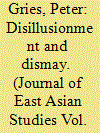| Srl | Item |
| 1 |
ID:
111169


|
|
|
|
|
| Publication |
2012.
|
| Summary/Abstract |
The deterioration of Sino-South Korean relations following the attacks on the Cheonan and on Yonpyong Island in 2010 has again raised the question of Chinese intentions in the Korean peninsula. In this article, I explore Chinese netizen views of the two Koreas. Qualitative and quantitative evidence (in the form of a large-scale national Internet survey) provide convergent evidence that while Chinese netizens feel coolly toward both Koreas, they think and feel about them in very different ways. Chinese netizens appear to be profoundly disillusioned with a North Korea that refuses to adopt Chinese-style "reform and opening," which only reminds them of their poor and authoritarian past. However, recent high-profile historical and cultural disputes appear to have led to widespread Chinese dismay and even anger toward South Korea as well, which is perceived to be poaching on China's proud cultural heritage. These attitudes toward Korea are reflective of evolving Chinese understandings of what it means to be Chinese in the twenty-first century.
|
|
|
|
|
|
|
|
|
|
|
|
|
|
|
|
| 2 |
ID:
114902


|
|
|
|
|
| Publication |
2012.
|
| Summary/Abstract |
Dr. Zhou Fangyin's 'Equilibrium Analysis of the Tributary System' enriches
the increasingly salient debate among Chinese International Relations (IR)
students on the so-called 'tributary system'
1
in three ways. First, it correctly
points out that China did not unilaterally create the mode of interstate
connections in pre-modern East Asia. Rather, the 'system', if there was
indeed such a thing, was an institutional mechanism mutually constructed
by both the central and peripheral regimes. This, in my opinion, is a crucial
clarification that revises the views of some of the Fairbankian School of
scholars, who insist that the tributary system was an institution enforced
by China on surrounding states that only passively accepted it.
2
Second, the
article differentiates between tributary discourse and practice, and emphasizes the system's internal logic in practical policy making. In another words,
by observing the tributary system as policy-oriented behaviour, the article
rejects the explanation of it as a (partially self-deceived) cultural phenomenon, instead emphasizing its realist significance as a rational political
arrangement. In so doing, it opens the way to further research on the
topic along the political science line.
|
|
|
|
|
|
|
|
|
|
|
|
|
|
|
|